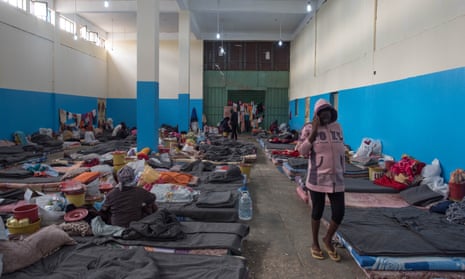The fatal shooting of two Eritrean men in Libya has raised concerns about overcrowding in a UN facility for refugees there.
The pair were reportedly killed in Tripoli last Thursday, days after they left the packed “gathering and departure facility” (GDF) managed by the UN refugee agency.
According to media reports, the UN had pressed them to leave its facility due to overcrowding, but in an email to the Guardian the agency denied this.
The UN set up the GDF in 2018 as an “alternative to detention”, but when the numbers of refugees being assigned to them increased, the UN began offering money to new arrivals to encourage them to either go home or find accommodation elsewhere.
In practice, many refugees use the money to rent a house in Libya and then depart by boat.
“The current situation makes the management of GDF unsustainable,” the UNHCR wrote. “Furthermore, overcrowding is preventing us from bringing vulnerable refugees from detention centres to the GDF for safety before departure from Libya. UNHCR fully understands that it is difficult for people to accept this situation; however we are limited in the options we are able to offer with the current number of available evacuation and resettlement places offered by states.”
Three refugees told the Associated Press that the two Eritrean refugees who were killed were among dozens forced out of the GDF 10 days ago.
Although the UNHCR has confirmed that the victims were initially staying at the GDF, the agency said the pair had left voluntarily and did not take cash help.
“No one is being pushed or forced out of the GDF,” the agency wrote. “It has operated as an open centre, where people have freedom of movement and can leave at any time.”
The UNHCR said on Friday it was “deeply saddened” by the deaths of the two Eritreans. According to the UN agency, “the incident appears to have been a robbery attempt at the accommodation they were living in, which is in an area of Tripoli well-known for crime and criminal activities”.
The GDF is intended to house refugees until they are resettled elsewhere or voluntarily repatriated. Unlike detention centres, refugees can leave the GDFs of their own volition. Libyan detention centres are nominally overseen by the UN-recognised government in Tripoli and are often run by officials involved in human trafficking.
According to the UNHCR, the facility is housing nearly 900 migrants, despite having been built for 600.
According to the New Arab, the pair were shot inside their accommodation and the circumstances were unclear. Three refugees told the Associated Press that the men were among dozens forced out of the GDF 10 days ago.
In November the UN was accused of trying to starve out refugees and asylum seekers who were sheltering for safety inside its GDF centre in Tripoli. A group of about 400 people who had come to the Tripoli facility in October had apparently been without food for weeks.
Internal documents seen by the Guardian showed that the UNHCR was planning to withdraw food from 600 other refugees and migrants in the centre. An aid worker with knowledge of the situation told the Guardian: “They are starving the population inside the [facility]. They’re just trying to starve them to motivate them to leave. It’s deliberately withholding aid to put people under pressure.”
The UNHCR admittied having encouraged people to leave an overcrowded Tripoli centre but said claims it was starving asylum seekers to force them out were offensive.
Separately, in August last year the UN International Organization for Migration (IOM) was the subject of a formal complaint after concerns” were raised about its treatment of Bangladeshi migrants in Tunisia.
A Tunis-based NGO alleged officials and diplomats had put pressure on a group of 64 Bangladeshis to return home after weeks at sea.
The Bangladeshis told the Guardian they felt pressed by the IOM to sign a voluntary return paper or risk arrest. They said diplomats from the Bangladeshi embassy had warned them that if they did not sign the voluntary return document, they would become victims of organ trafficking.
The IOM has denied any pressure was applied to the migrants to return to Bangladesh.
There have been other shootings of refugees or migrants in Libya recently. Alarm Phone, a hotline service for migrants in distress, reported on Saturday that a migrant had been shot by the Libyan coastguard and his body thrown into the sea.
The man was among a group of 65 asylum seekers traveling on a boat that was intercepted at sea by the Libyans. Some of the 65 people reportedly refused to disembark in Tripoli. IOM has not confirmed the killing and said the man sustained wounds before departing.
In September a Sudanese man was reportedly shot after resisting being taken to a detention centre. He had been among a group of 103 migrants whose boat was stopped at sea by the Libyan coastguard while attempting to cross the Mediterranean.
UNHCR has been contacted for comment.
This article was amended on 27 January 2020 to clarify that the GDF is a single entity located in Tripoli.
Additional reporting by the Associated Press
